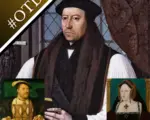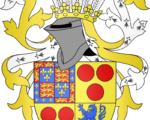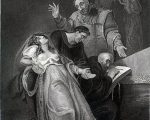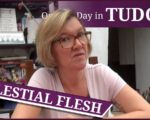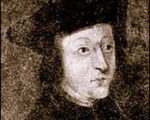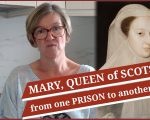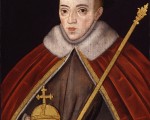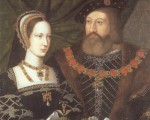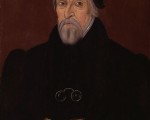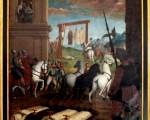15th October:
1536 – Henry VIII wrote to the Earl of Shrewsbury, the Duke of Suffolk “and others” with instructions on handling the rebellion which we now know as the Pilgrimage of Grace. The King also wrote to the rebels in Lincolnshire promising “to show them mercy if they leave all their harness and weapons in the market-place of Lincoln”.
1537 – Christening of Henry VIII’s son, the future Edward VI, in the Chapel Royal at Hampton Court. Edward’s half-sister Mary stood as godmother, while his other half-sister, the four year-old Elizabeth, bore the chrisom cloth, helped by Edward’s uncle, Edward Seymour. Thomas Howard, the Duke of Norfolk, Charles Brandon, the Duke of Suffolk, and Archbishop Cranmer stood as godfathers.
1542 – Death of William Fitzwilliam, Earl of Southampton, courtier, diplomat and naval commander, in Newcastle-upon-Tyne. It is thought that he was buried in Newcastle. Southampton’s offices included Vice Admiral, Treasurer of the Household and Lord Privy Seal. He died while leading troops to Scotland under the command of Thomas Howard, 3rd Duke of Norfolk.
1582 – The first day of the Gregorian calendar following the last day of the Julian calendar, 4th October 1582, meaning that the 5th-14th October did not exist in the year 1582. Many countries ignored Pope Gregory XIII’s papal bull and carried on using the Julian Calendar. England, for example, did not introduce the Gregorian calendar until 1752.
1584 – Execution of Richard Gwyn (White), martyr, schoolteacher and Welsh language poet, at Wrexham in Wales. He was hanged, drawn and quartered for high treason because of his Catholic faith.
1590 – Death of William Bleddyn (Blethin), Bishop of Llandaff. He was buried in Matharn Church, in the chancel.
1595 – Death of Philip Howard, 13th Earl of Arundel, in the Tower of London. It was rumoured that his cook had poisoned him. Arundel had been imprisoned for high treason, because of his Catholic faith and for fleeing England without Elizabeth I’s permission. He was buried in the Tower chapel, St Peter ad Vincula.
[Read More...]
